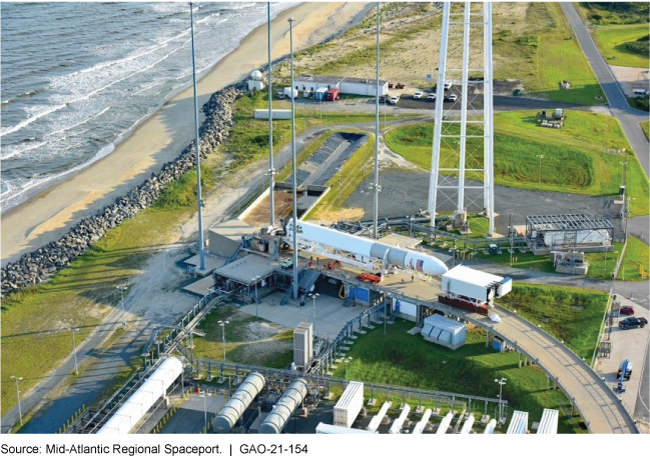Commercial Space Transportation: FAA Should Examine a Range of Options to Support U.S. Launch Infrastructure
Fast Facts
Demand for commercial space launches is expected to increase. Twelve launch sites held operator licenses in Aug. 2020, and 11 more were seeking licenses from the Federal Aviation Administration.
Congress asked the FAA to recommend ways to facilitate and promote investments in space transportation infrastructure. The FAA told us that its response would focus on 2 existing FAA grant programs.
But we recommended that the FAA examine more options to maximize the effect of federal investments. Other options might include tax incentives or additional investments in technologies to allow for more launches at existing facilities.
One of the launch pads at the Mid-Atlantic Regional Spaceport in Virginia.

Highlights
What GAO Found
Launch providers support the deployment of people and payloads, such as national security and commercial satellites or research probes, into space. The majority of these providers told GAO that U.S. space transportation infrastructure—located at sites across the country—is generally sufficient for them to meet their customers' current requirements. This situation is in part a result of the launch providers' investments in launch sites, along with state and local funding. Launch providers and site operators alike seek future improvements but differ on the type and location of infrastructure required. Some launch providers said that infrastructure improvements would be required to increase launch capacity at existing busy launch sites, while a few site operators said that new infrastructure and additional launch sites would help expand the nation's overall launch capacity.
U.S. Commercial Launch Sites with Number of FAA-Licensed Launches, January 2015 - November 2020

The Federal Aviation Administration (FAA) was directed by statute to make recommendations to Congress on how to facilitate and promote greater investments in space transportation infrastructure, among other things. However, FAA's initial draft report was limited because it focused only on two existing FAA programs, rather than a range of options. FAA officials stated that they did not examine other options because of limited time and resources, and that the two identified programs could be implemented quickly because FAA has administrative authority to manage them. Leading practices in infrastructure investment emphasize the importance of conducting an examination of potential approaches, which can help identify how best to support national interests; avoid overlap or duplication of federal effort; and enhance, not substitute, participation by non-federal stakeholders. An examination may also help identify alternatives to making funding available, such as increasing efficiency and capacity through technology improvements. By focusing only on these existing programs, FAA may overlook other options that better meet federal policy goals and maximize the effect of any federal investment. Although FAA has already prepared its initial report to respond to the statute, it still has opportunities, such as during subsequent mandated updates, to report separately on potential approaches.
Why GAO Did This Study
Demand for commercial space launches is anticipated to increase in the coming years. FAA, the agency responsible for overseeing the sites where these launches occur, was directed by statute to submit a report—and update it every 2 years until December 2024—that makes recommendations on how to facilitate and promote greater investments in space transportation infrastructure.
The FAA Reauthorization Act of 2018 included a provision for GAO to review issues related to space transportation infrastructure. This report discusses launch providers' and site operators' views on the sufficiency of infrastructure in meeting market demand and assesses the steps FAA has taken to identify options for federal support of space transportation infrastructure, among other things. GAO reviewed relevant regulations; assessed FAA's actions against GAO-identified leading practices; and interviewed FAA officials, commercial launch providers, and representatives from U.S. commercial launch sites that GAO identified as having hosted an FAA-licensed launch since 2015 or having an FAA launch site operator license as of August 2020.
Recommendations
GAO recommends that FAA examine a range of potential options to support space transportation infrastructure and that this examination include a discussion of trade-offs. DOT partially concurred, noting that it would provide its mandated report to Congress but not conduct a new examination of a range of options. GAO continues to believe that such an examination is warranted.
Recommendations for Executive Action
| Agency Affected | Recommendation | Status |
|---|---|---|
| Commercial Space Transportation | We recommend that the Associate Administrator for AST provide Congress the results of an examination of a range of options—including funding and financing tools, as well as alternatives to making funding available—to support space transportation infrastructure. This examination should include a discussion of trade-offs and whether and how, if at all, each approach would contribute to national policy goals. (Recommendation 1) |
In September 2025, AST updated GAO on its efforts related to space transportation infrastructure needs. The National Spaceport Interagency Working Group completed a draft report that includes recommendations developed with input and support from industry. Working group members briefed their agency's leadership on the report in preparation for next steps. Additionally, the updated National Spaceports Policy congressional report must be submitted to OMB for review before being finalized and submitted to Congress. FAA is also coordinating across several agencies on the report. AST plans to complete its work by March 31, 2026. GAO will continue to monitor AST's actions in this area.
|
